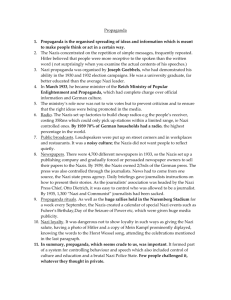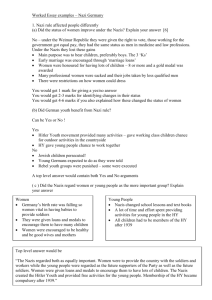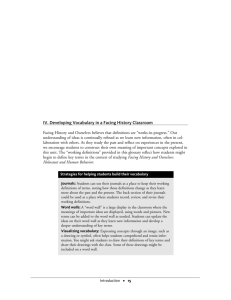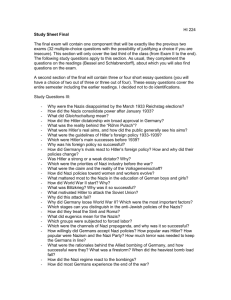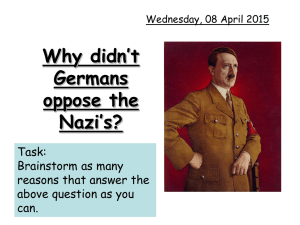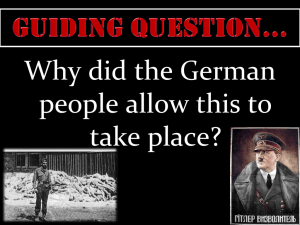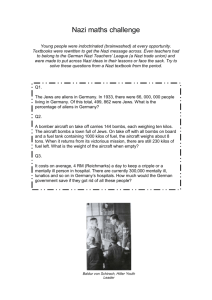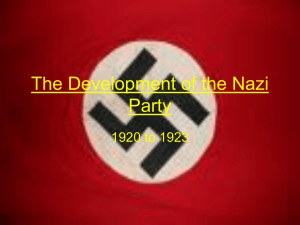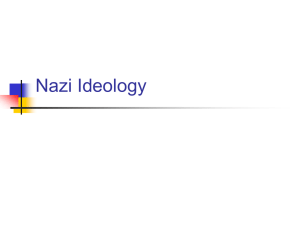Life in Nazi Germany - Allerton Grange High School
advertisement
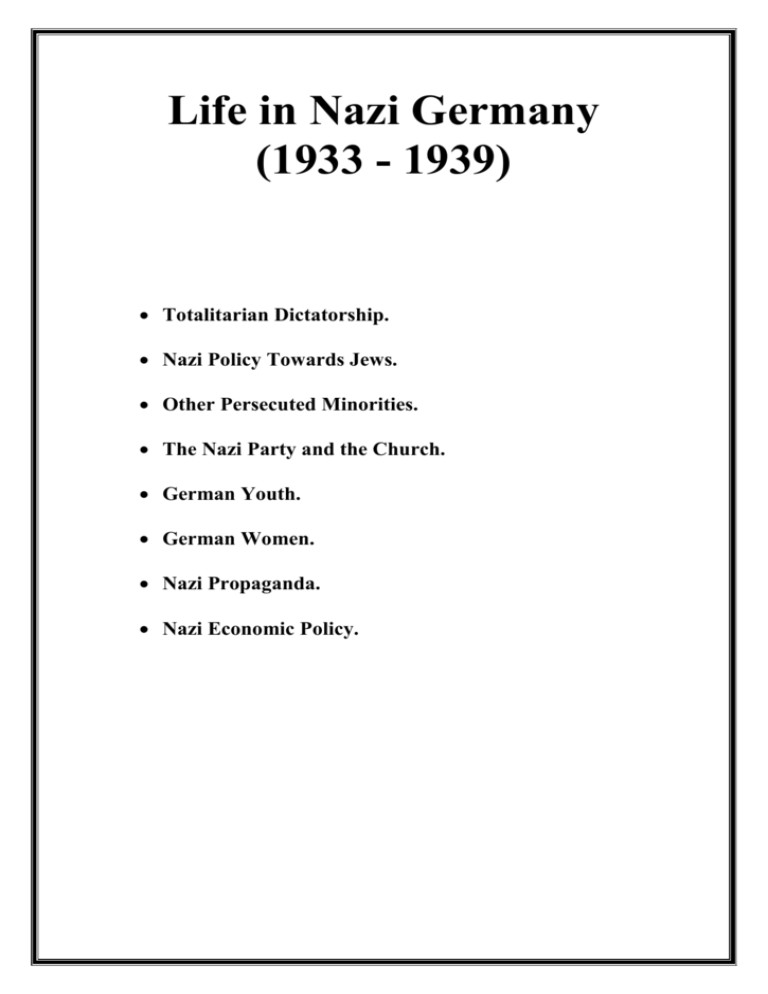
Life in Nazi Germany (1933 - 1939) Totalitarian Dictatorship. Nazi Policy Towards Jews. Other Persecuted Minorities. The Nazi Party and the Church. German Youth. German Women. Nazi Propaganda. Nazi Economic Policy. GCSE Revision Notes Life in Nazi Germany (1933 - 1939) Totalitarian Dictatorship: Adolf Hitler was the dictator of Germany, which meant he held absolute power and had to answer to nobody. Germany became a totalitarian state, which meant a state where all political parties were banned except the Nazi Party that controlled every aspect of life. It was a police state where the secret police, the Gestapo, spied on everyone and had the power to the right to arrest, torture, imprison and kill people without trial. Anybody who criticised Hitler and the Nazi Party would be arrested and sent to concentration camps to be used as slave labour or would be executed. Hitler declared Germany under his rule to be the “Third Reich” which would last a 1000 years and the German Aryan master race were destined to rule the world. The reasons why Hitler hated Jews included: He viewed Jews as the bottom of all the races that he defined as “subhuman.” They were a useful scapegoat for the Nazis to blame all of Germany’s problems on. He blamed Jews for Germany defeat during the First World War and the Treaty of Versailles. He blamed wealthy Jews for trying to secretly rule the world through control of banks and other international financial institutions. He blamed Jews for new cultural changes that he saw as threatening to traditional German cultural values and traditions. He blamed Jews for Communism because the founder of the Communism, many leaders of the Russian Revolution and of the German Communist Party were Jewish. Nazi policy towards Jews (1933 - 1939): Nazi policy towards Jews between 1933 to 1939 was based on pressuring all the Jews of Germany to leave the country. The decision to murder all Jews in gas chambers during the Holocaust (which the Nazi’s called The Final Solution) was not made until after the Second World War broke out when forcing Jews to leave Europe was no longer possible. The Nazi’s pressured Jews to leave Germany (emigrate) by: The Boycott (1933). The Nuremberg Laws (1935). Kristallnacht/The Night of Broken Glass (1938). The Boycott (1933): The Nazi’s launched anti-Semitic national propaganda campaign against Jews as soon as they seized power in 1933. H. Alnassiri 2 GCSE Revision Notes Life in Nazi Germany (1933 - 1939) In 1933 the Nazi’s organised a boycott of Jewish businesses in which they encouraged Germans to avoid using business owned by Jews. By 1934 Jews and their businesses had to display a yellow star to show that they were Jewish and to warn Germans from dealing with them. Jews were forced to use separate facilities like swimming pools from Germans and were sacked from government posts, education and the media. The Nazi’s were trying to pressure Jews to leave Germany by humiliating them and making them feel unwelcome in their own country. The Nuremberg Laws (1935): Hitler passed The Nuremberg Laws that were announced in the city of Nuremberg. They declared that Jews were no longer German citizens and were therefore no longer protected by the law. Jews were banned from having sex or marrying Germans to preserve the “purity” of the German Aryan master race. Jews increasingly found it difficult to live because they were sacked from their jobs could not find work and would not be served by German shopkeepers. Kristallnacht/The Night of Broken Glass (1938): In November 1938 a Jew shot dead a Nazi official in France. The Nazis used the attack as a pretext to start a violent campaign against those Jews who had not yet chosen to leave Germany. In a week of violence Jewish synagogues, businesses and homes were attacked, looted and burned. The Nazi’s made all the Jews of Germany pay a collective fine of one billion marks and made Jews clean up the streets on their hands and knees. By 1939 Tens of Thousands of Jews were arrested and sent to concentration camps. Other Persecuted Minorities: Besides Jews the Nazi’s persecuted anyone who opposed their views or did not fit into their definition of the German Aryan master race including: Communists. Democrats (People who believed in democracy). Pacifists (People who believed that war was wrong). Homosexuals. The mentally & physically disabled (They were sterilised and some were gassed). The Socially Un-Useful (Beggars, tramps & alcoholics). Black & Asian people (though there were few in Germany at this time). Gypsies. Slavs (Eastern European and Russian people). H. Alnassiri 3 GCSE Revision Notes Life in Nazi Germany (1933 - 1939) The Nazi Party and the Church: The Nazis wanted the Church to support the Nazi Party’s ideas and policies. Churches were ordered to teach that Jesus was an Aryan and not a Jew. Protestant Churches were brought together in one Reich Church under Nazi control. Churches were told to emphasise that Jews not the Romans had crucified Jesus. In 1933 a Concordat (agreement) was signed between Hitler and the Catholic Church not to interfere in politics in return for the Nazis not interfering in the Church. Priests like Martin Niemoller who attacked Nazi ideas and policies as unChristian were imprisoned or executed. The Reasons why there was little opposition to the Nazis included: Political opponents like Communists had been eliminated. People felt better off under the Nazis than under the old Weimar Republic. Nazi propaganda kept up public support for the government and did not let people know what was really going on in the country. Ordinary people feared the SS and Gestapo who would arrest, torture, imprison and kill anyone who spoke out against the Nazi Party’s ideas and policies. German Youth: The Nazi party controlled education and used it to indoctrinate young people who represented the next generation into believing Nazi ideas. All teachers had to belong to the German Teachers League, which was a Nazi Party organisation, or were sacked from their jobs. Teachers were ordered to put across Nazi ideas in their lessons; for example, in History children were taught that the Nazi Party had saved Germany. To help build the master race children were taught about Nazi racist ideas about the superiority of Aryans and inferiority of Jews and Slavs in biology and eugenics. PE was emphasised in Nazi school timetables to make children physically fit as expected of members of the master race and to prepare them for the army. Girls were taught separate subjects from boys like home economics and child care to make them perfect wives and mothers when they grew up. Boys had to join the Hitler Youth, the Nazi youth organisation similar to the boy scouts, which taught them Nazi ideas and provided military training after school. German Women: Hitler and the Nazis had sexist views when it came to the role of women in Germany. Women were encouraged how to wear their hair, makeup and clothes. Women were dismissed from their jobs as civil servants, teachers and doctors. H. Alnassiri 4 GCSE Revision Notes Life in Nazi Germany (1933 - 1939) Women were encouraged to stay at home rather than go to work to lead the life of perfect wives for their husbands and mothers for their children. They believed that the first and most important role for women was to have as many children as possible to increase the size of the master race and soldiers for the army. In 1933 the Nazis past the Law for the Encouragement of Marriage which gave couples 1000 marks as a gift for getting married. Married couples were given 250 marks as a gift for each child that they had to encourage a growth in the national birth rate. Nazi Propaganda: The Nazis used propaganda to keep up public support, to spread their ideas, to scare their enemies and to encourage pride in Germany and the Aryan master race. The Nazi minister of Propaganda, Joseph Goebbels, censored (controlled) all the newspapers, cinemas, radio, books and plays in Germany. The Nazi’s made cheap radios called “Peoples Receivers” available to all households in Germany saw that they could listen to Nazi propaganda. The Nazi Party held mass rallies in the city of Nuremberg that were designed to show the power and support of the people for the Nazi Party. The Nazis only allowed German culture and banned all films, art, music and books written by Jews and other “subhuman” peoples. Nazi Economic Policy included: The Nazis Party wanted to solve the depression. The Nazis wanted create jobs for the millions of unemployed. The Nazis wanted to rearm Germany. The Nazis wanted to make Germany self-sufficient. The Nazis wanted to control German workers. The Nazis solved unemployment by: Young unemployed people aged 18 to 25 were conscripted into they National Labour Service where they wore uniforms to various jobs like planting forests. The Labour Front gave unemployed skilled people work on public schemes like building motorways (autobahns) schools, hospitals and other public buildings. In 1935 the Nazis introduced conscription and started placing major orders for tanks, aeroplanes, battleships and submarines that provided many new jobs. The Nazis created more jobs for the unemployed by sacking Jews, political opponents and women from their jobs, which created new vacancies in the workplace. The Nazi Party itself created jobs as new jobs were created in working for the Party and its new mass party organisations like the Hitler Youth, the Gestapo etc. The Nazi policies were so successful that by 1939 the Nazis were declaring that they were suffering from a shortage of labour. H. Alnassiri 5 GCSE Revision Notes Life in Nazi Germany (1933 - 1939) Self-Sufficiency (Autarky): The Nazis wanted Germany to be self-sufficient, a policy called autarky, so that they made their own food and resources rather than having to import them from abroad. The Nazis wanted to make Germany self-sufficient so that during war the country would not be effected by any embargoes as it was during the First World War. The government invested heavily into making new factories and mines to produce coal, oil, iron, steel, rubber, fuel and textiles. A Four Year Plan was drawn up in 1936 with the aim of making Germany self-sufficient within four years but it failed to make Germany self-sufficient. The desire to make Germany self-sufficient would become part of the reasons why Hitler insisted on Germany’s need for Lebensraum (living space). Controlling German Workers: All German workers had to join the German Labour Front. Trade Unions were banned, strikes made illegal, workers could not bargain for higher wages or the number of hours that they worked. The German Labour Front set up “Strength Through Joy” which organised workers free time while on holiday like cheap holidays, foreign holidays and sea cruises. The Nazis popularised the Volkswagen (Peoples Car), based on Henry Fords Model T, which workers could pay for on a higher purchase scheme. H. Alnassiri 6 GCSE Revision Notes Life in Nazi Germany (1933 - 1939) GLOSSARY Anti-Semitism (Hatred of Jews.) Aryan (German people with blue eyes and blonde hair.) Autarky (German for self-sufficiency which means not being dependent on importing goods like food and raw materials from abroad.) Boycott (When people stop dealing or using businesses owned by a certain group.) Conscription (When the government forces men to join the army by law.) Communism (Belief in creating an equal society by workers organising a revolution against the ruling class.) Democracy (Countries whose governments are chosen by free and fair elections.) Depression (The rapid loss of wealth in the economy.) Dictator (When an individual holds absolute power and answers to nobody.) Economy (The wealth of a country or how businesses in a country are doing.) Gestapo (The name of the Nazi secret police.) Eugenics (The science of breeding by controlling who gets married and has children.) Gross Deutschland Reich (Greater German Empire.) Hitler Youth (The Nazi youth organisation to which all German male teenagers had to join.) Indoctrinate (To make people believe something even if its not true through propaganda in the media and education system.) Kristallnacht (The Night of Broken Glass when Jewish places of worship called Synagogues were attacked across Germany.) Mein Kampf (Means “My Struggle” and was the book Hitler wrote while in prison containing his political ideas.) Militarism (The use of military force to solve a countries problems is better than peaceful negotiations.) Nazi Party (Short for the German abbreviation NSDAP which stands for the National Socialist German Workers Party.) Nuremberg Laws (Declared that Jews were no longer German citizens protected by the law.) Police State (A country under dictatorship where the policy have the right to arrest, torture, imprison and kill people without trial.) Propaganda (Making people believe in a cause even by lying.) Reich (German for “state” or “empire”.) Reichstag (The German Parliament.) Rightwing (Parties that want things to stay the same or get even stricter e.g. nationalists, fascists, Nazis etc.) SA (The “Storm Troopers” or “Brown Shirts” were the Nazi Party’s private army.) Secret Police (A political security force in charge of keeping a dictator in power by arresting, torturing, imprisoning and killing without trial all enemies of a dictator.) Slavs (Peoples from Eastern Europe and Russia.) SS (The “Special Service” or “Black Shirts” were Hitler’s private bodyguards who later became in charge of security for the Third Reich.) Subhumans (The Nazi racist name for Jews, Gypsies and Slavs whom they viewed as being closer to animals than human beings.) Third Reich (Name of Germany under Nazi rule between 1933 – 1945.) Totalitarianism (When one political party controls all aspects of life in a country.) H. Alnassiri 7 GCSE Revision Notes Life in Nazi Germany (1933 - 1939) Life in Nazi Germany (1933 - 1939). No Unsure Yes? Totalitarian Dictatorship. Nazi Policy towards Jews (1933 - 1939). - The Reasons why Hitler hated Jews. - The Boycott (1933). - The Nuremberg Laws (1935). - Kristallnacht/The Night of Broken Glass (1938). Other Persecuted Minorities. The Nazi Party and the Church. The reasons why there was little opposition to the Nazis. German Youth. - Nazi Education Policy. - The Hitler Youth. German Women. Nazi Propaganda. Nazi Economic Policy. - How the Nazis solved unemployment. - How the Nazis wanted Self-Sufficiency (Autarky). - How the Nazis Controlled German Workers. H. Alnassiri 8

